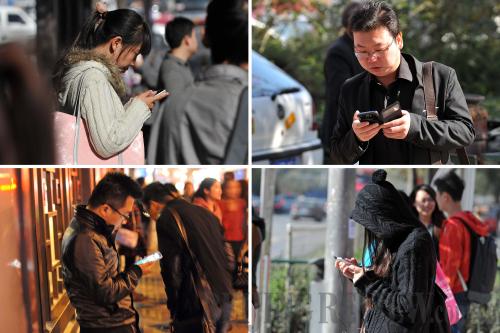|
 |
|
TECHNOLOGICAL PRISONERS: Heads bowed, people concentrate on their cellphones on the streets of Taiyuan, the capital city of north China's Shanxi Province, on October 25, 2013 (ZHAN YAN) |
Recently, Dangdang.com, China's biggest online book retailer, released its bestseller lists for 2013, which showed that Chinese readers strongly favored what have been termed "wenyi-style" books over the past year.
Wenyi-style literally means literature (wen) and art (yi) in the Chinese language. Fans of wenyi-style things tend to love literature, enjoy art movies, collect artworks, and favor a simple and casual dress style in their everyday life.
The Dangdang.com list has once again drawn public attention to discussions on the decline of reading as a hobby in China. Many experts have already voiced anxiety over this steady loss of interest, especially its prevalence among China's youth.
On July 18, 2013, Xining Evening News, which is based in China's Qinghai Province, published a story written by an Indian engineer named Sharmistha Mohapatra who lived and worked in Shanghai, and was astonished by the loss of interest in reading that she witnessed in China.
In the article, Mohapatra wrote about a flight she took from Frankfurt, Germany to Shanghai, China. While waiting in Frankfurt Airport, she saw most of the German travelers were quietly reading or working with a cup of coffee, a newspaper, a book, a kindle or a laptop; while most of the Chinese passengers were busy shopping or chatting. Then during the flight, most Chinese people played in-flight electronic games or watched movies, and she noticed again that none were reading.
She wrote that she had thought it strange that China had the world's longest tradition of reading, but today's Chinese seemed too impatient to sit down and read a book.
Indeed, many Chinese people have expressed the same concerns. "On the subway, I see many people, especially young people, play games or watch videos on their cellphones or iPads. But few choose to read a book," said Liu Weili, a senior teacher at a middle school in Beijing.
"It is not that the Chinese people don't read. In fact, many people refresh their micro-blog or WeChat every 10 minutes, although this enthusiasm is not seen transferring over to reading books. Helping people to restore their reading habit is a matter of urgent need," said Liu.
Zhu Yiqi is a 27-year-old engineer at a company in Beijing with foreign investment. Like many people of his age, he spends what little free time he has outside of working, eating and sleeping on his cellphone and iPad. In the morning, he checks his e-mails and browses the news with his cellphone on the subway. After lunch, he refreshes his micro-blog and WeChat on the cellphone again. When he comes home after work, he plays games on his iPad.
When asked about reading a book, Zhu fell silent. He said, "I haven't read a good book seriously for a long time, and I can't even remember when the last time I read a book was."
Zhu admitted he had done all his reading on cellphone or computer in recent years. Since games have begun occupying almost all his spare time, his cellphone reading is limited to short articles that are less than 100 words.
"When I pick up a heavy book, I find it difficult to concentrate. Sometimes, an article with more than four paragraphs will seem too long for me. Intensive reading has become a hard and painful task."
Zhu is a typical example of Chinese born in the 1980s and the 1990s. Cellphones have become their favorite tool, with which they can easily read and keep up to date with news and trends through refreshing their micro-blog and WeChat accounts anywhere at any time.
| 